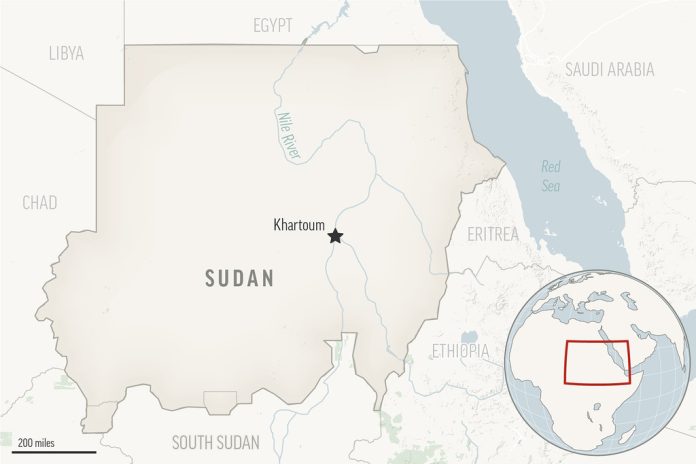CAIRO (AP) — New fighting rocked Sudan’s capital on Thursday with airstrikes and drone attacks in and around Khartoum amid a worsening cholera outbreak, officials said.
Sudan’s military launched an operation in the early hours of Thursday aimed at taking control of areas in the capital that had been in the hands of its enemy, the paramilitary Rapid Support Forces. Sudanese media reported increased military movements and airstrikes in the districts of Khartoum and Omdurman, the heaviest in the capital area in months.
Mohamed Ibrahim, the health ministry’s spokesperson in Khartoum, said in a statement that 4 civilians were killed and 14 others injured in the latest fighting in the Karrari district of the capital.
A military spokesman confirmed the operation was underway, but declined to comment further. The escalation comes as the head of Sudan’s military, Gen. Abdel-Fattah Burhan is expected to address the United Nations’ General Assembly on Thursday.
Jeremy Laurence, a spokesman for the U.N. human rights office in Geneva, said in a statement to The Associated Press Thursday that at least 78 civilians were killed due to artillery shelling and airstrikes since the beginning of September in the Khartoum area.
“Our immediate concern is for the welfare of civilians, and the likelihood of further displacement and damage to civilian infrastructure,” he said.
For months, some of the worst fighting has been in the city of El Fasher, the capital of the North Darfur state. RSF forces have laid siege to the city since May. On Thursday, UN Human Rights Chief Volker Türk said that artillery shelling on a market there had killed at least 20 civilians on Sep. 20 and 21.
Meanwhile, the death toll from Sudan’s cholera outbreak jumped by nearly 100 or nearly 20% in only two days, Sudan’s health ministry said Wednesday, in a worrying sign that the disease is spreading more rapidly. A total of 473 people have died from cholera since the country’s rainy season began two months ago, health officials said.
Sudan’s Federal Ministry of Health in a Wednesday update reported on Facebook 14,944 cholera cases across 10 states, with 386 new cases. It said six people died on Tuesday alone in six states.
The majority of cases were reported in Kassala, where UNICEF is collaborating with the ministry and the World Health Organization (WHO) to carry out a second round of the oral cholera vaccination campaign that kicked off last week.
UNICEF delivered 404,000 doses of the vaccine to Sudan on Sep. 9. More vaccination campaigns are expected to be rolled out in other affected states.
Cholera was officially declared an outbreak on August 12 by the health ministry after a new wave of cases was reported starting July 22. The disease is spreading in areas devastated by recent heavy rainfalls and floods, especially in eastern Sudan which sheltered millions of people displaced by the conflict between the Sudanese military and a rival paramilitary group, the Rapid Support Forces (RSF).
Cholera is a highly contagious disease that causes diarrhea, leading to severe dehydration and could be fatal if not immediately treated, according to WHO. It’s transmitted through the ingestion of contaminated food or water.
Over 900 areas in 11 states have been affected by cholera between June and September 24, with the northern state being the most impacted, according to the ministry.
UNICEF said in a statement last week that an estimated 3.4 million children under the age of five are at high risk of epidemic diseases.
The war in Sudan created environments prone to disease outbreaks, impacting millions of people already experiencing food insecurity and displacement. The country plunged into war in April 2023 after tensions increased between the military and the RSF.
———
AP chief correspondent in Geneva Jamey Keaten contributed to this report.
Source: post





